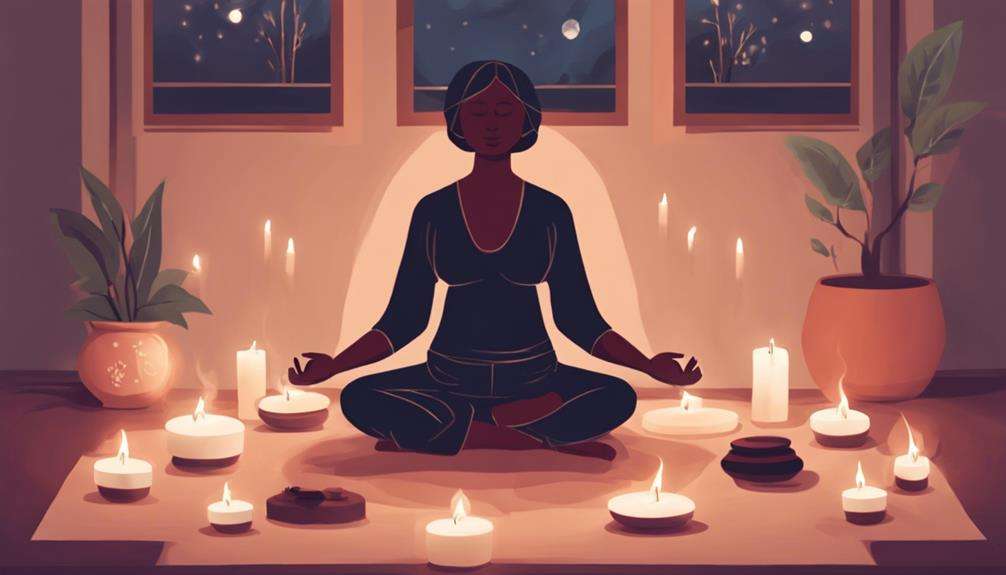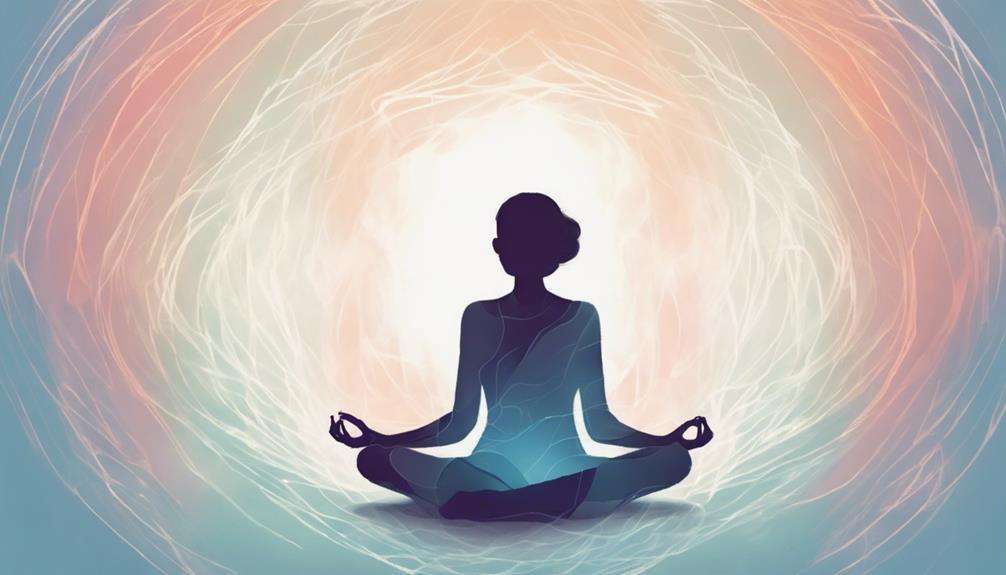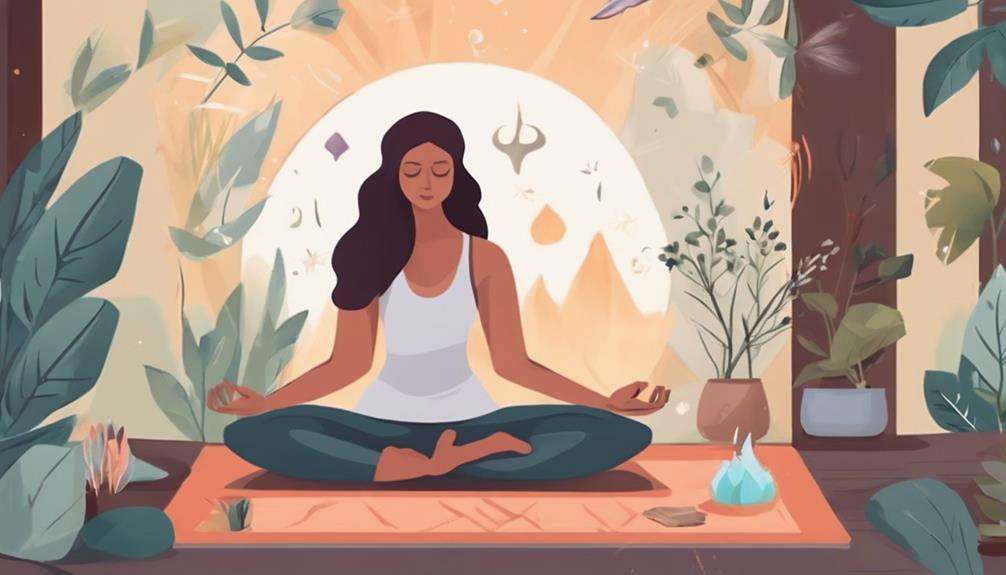Did you know that anxiety disorders affect over 40 million adults in the United States alone? Finding effective ways to manage anxiety is crucial for your overall well-being.
Discover how incorporating these 7 best practices into your meditation routine can help you cultivate inner peace and resilience in the face of anxiety.
Key Takeaways
- Mindfulness Meditation cultivates emotional resilience and peace for anxiety relief.
- Loving-Kindness Meditation promotes compassion and reduces anxiety and depression symptoms.
- Body Scan Meditation increases awareness and releases tension for overall well-being.
- Breath Awareness Meditation reduces stress, cultivates mindfulness, and calms the mind.
Mindfulness Meditation
If you're looking to calm your anxiety, Mindfulness Meditation can be a powerful tool to help you focus on the present moment and cultivate emotional resilience. This practice involves directing your attention to the here and now, without judgment, which can be incredibly beneficial for managing feelings of anxiety and stress. By engaging in Mindfulness Meditation regularly, you can train your mind to acknowledge anxious thoughts and sensations without getting overwhelmed by them. Research has shown that this form of meditation can lead to physical changes in the brain, particularly in areas related to emotion regulation, ultimately promoting a sense of inner peace and calm.
When you're feeling anxious, Mindfulness Meditation offers a way to observe your thoughts without becoming entangled in them. This mental exercise can help you develop a healthier relationship with your anxious feelings, allowing you to respond to them with greater clarity and composure. By incorporating Mindfulness Meditation into your routine, you may find yourself better equipped to manage stress and improve your overall mental health.
Loving-Kindness Meditation
Loving-Kindness Meditation, also known as Metta meditation, is a practice that focuses on nurturing feelings of compassion and kindness towards oneself and others. Engaging in this form of meditation can have a profound impact on your well-being, fostering positivity and empathy.
- Promotes Positive Emotions: By repeating phrases like 'May I be happy, may I be healthy,' this practice cultivates feelings of compassion and kindness, boosting your mood.
- Reduces Anxiety and Depression: Studies have shown that Loving-Kindness Meditation can help alleviate symptoms of anxiety and depression, promoting mental wellness.
- Enhances Empathy: Regular practice of this meditation can enhance your ability to understand and share the feelings of others, strengthening your connections.
- Fosters Self-Compassion: Through fostering kindness towards yourself, Loving-Kindness Meditation nurtures self-compassion, leading to improved emotional resilience.
Body Scan Meditation

Exploring a new dimension of mindfulness and relaxation, Body Scan Meditation guides you through a systematic focus on different parts of your body, fostering awareness and tranquility. This meditation practice involves starting from your toes and gradually moving up through each body part, allowing you to release tension and reduce physical discomfort often associated with anxiety. By engaging in body scan meditation, you not only promote relaxation but also cultivate mindfulness and self-awareness. Whether you choose to practice this technique lying down or sitting comfortably, it remains accessible to individuals with varying physical abilities, making it a versatile tool for stress reduction.
Through regular sessions of body scan meditation, you can ground your mind and body in the present moment, fostering a deeper sense of connection and presence. This practice empowers you to tune into your body's signals, identify areas of tension, and ultimately work towards enhancing your overall well-being. Embrace the opportunity to embark on this journey of self-discovery and relaxation through the transformative practice of body scan meditation.
Guided Meditation
Embark on a journey of relaxation and self-discovery through the practice of guided meditation, which offers structured guidance to help focus and calm your mind. Guided meditation can be a powerful tool in managing anxiety and stress while enhancing your emotional well-being.
Here's why you should consider incorporating guided meditation into your routine:
- Structured Support: Guided meditation provides a framework for your practice, making it easier to stay focused and relaxed.
- Address Specific Concerns: Sessions can be tailored to address your specific needs, whether it's anxiety, stress, or simply seeking relaxation.
- Enhance Self-Awareness: By following the guidance of a teacher or guide, you can deepen your self-awareness and understanding of your emotions.
- Deepen Meditation Experience: Using guided meditation can take your practice to a new level, allowing you to explore different techniques and approaches to meditation effectively.
Incorporating guided meditation into your routine can offer you the support and structure you need to manage anxiety and enhance your overall well-being.
Breath Awareness Meditation
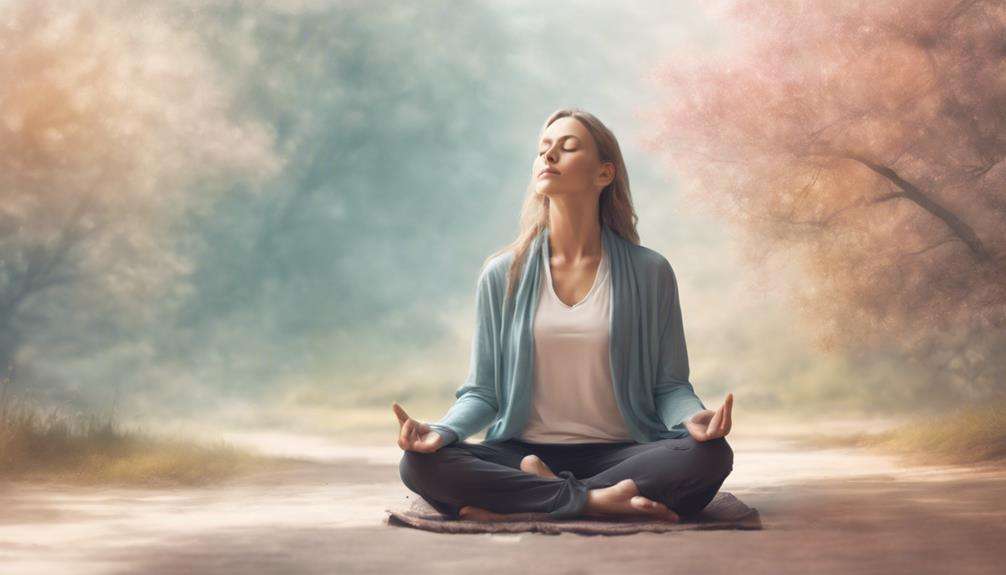
If you're looking to further enhance your mindfulness practice and effectively manage anxiety, consider incorporating breath awareness meditation into your routine.
This form of meditation involves focusing on the sensation of breathing in and out. By directing your attention to the breath, you can calm your mind, reduce stress, and promote relaxation.
The act of focusing on your breath helps cultivate mindfulness and presence, allowing you to stay grounded in the present moment. One of the great benefits of breath awareness meditation is that it can be practiced anywhere, anytime, making it a convenient tool for anxiety management.
Research has shown that regular practice of breath awareness meditation can lower anxiety levels and improve overall well-being. So, next time you feel overwhelmed or anxious, take a few moments to sit quietly and pay attention to the rhythmic sensation of your breathing – it might just help bring a sense of peace and calm to your day.
Progressive Muscle Relaxation
To effectively manage anxiety and reduce stress, consider incorporating Progressive Muscle Relaxation (PMR) into your routine. PMR is a structured practice that involves tensing and relaxing different muscle groups to reduce anxiety and stress levels.
Here are four reasons why you should try Progressive Muscle Relaxation:
- Increase Body Awareness: PMR helps in increasing your awareness of tension held in different parts of your body, allowing you to release physical tension associated with anxiety symptoms.
- Promote Relaxation: By systematically tensing and then relaxing muscles, PMR promotes deep relaxation, which can alleviate anxiety symptoms and improve mental health.
- Improve Sleep Quality: Practicing PMR before bedtime can help improve sleep quality by reducing physical and mental tension that may interfere with a good night's rest.
- Easy to Learn and Implement: PMR is an easy technique to learn and can be implemented almost anywhere, making it a convenient tool for managing anxiety and promoting overall well-being.
Yoga and Meditation for Anxiety
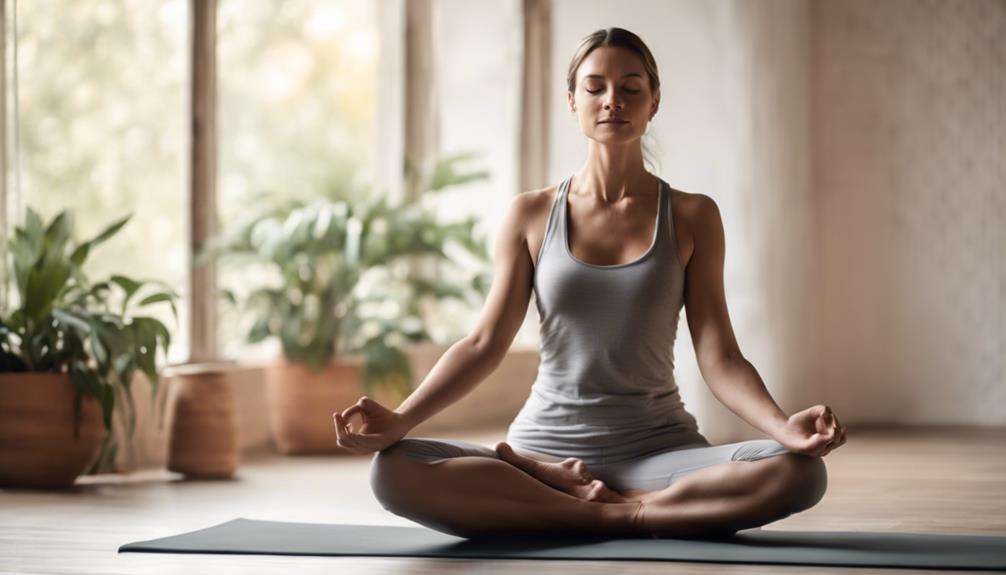
If you're seeking ways to ease anxiety, exploring yoga and meditation can be beneficial. These practices combine physical movements, controlled breathing, and mindfulness techniques to help lower stress levels.
Benefits of Yoga
When considering ways to alleviate anxiety, exploring the benefits of yoga and meditation can offer a holistic approach to reducing symptoms and promoting overall well-being. Here are some key benefits of incorporating yoga into your routine:
- Yoga integrates physical postures, breathing techniques, and meditation to reduce anxiety symptoms.
- Research shows that yoga can decrease cortisol levels, the stress hormone linked to anxiety.
- Practicing yoga regularly can improve mood, increase relaxation, and enhance overall well-being.
- Yoga poses like child's pose, downward dog, and corpse pose promote relaxation and calm the mind.
Meditation Techniques
Looking to ease your anxiety through meditation techniques like yoga and mindfulness?
Yoga incorporates various meditation practices, including mindfulness meditation and loving-kindness, to cultivate emotional resilience and reduce anxiety symptoms.
By combining yoga postures with meditation techniques like breath awareness, you can effectively reduce cortisol levels, the stress hormone, promoting relaxation and calm.
These practices not only help alleviate anxiety but also enhance self-awareness, reduce anxiety triggers, and improve overall emotional balance.
Regular practice of yoga and meditation can significantly contribute to your mental well-being by fostering a deeper connection between your mind and body, leading to a greater sense of peace and tranquility in your daily life.
Mind-Body Connection
To understand how yoga and meditation can effectively alleviate anxiety, it's crucial to grasp the profound impact of the mind-body connection on managing and reducing stress levels.
Here's how yoga can help calm your mind and reduce anxiety symptoms:
- Physical Postures: Yoga combines physical postures with breathwork to calm the mind.
- Mindful Movement: Engaging in mindful movement through yoga helps release tension, promoting relaxation.
- Enhanced Self-Awareness: Yoga and meditation work together to enhance the mind-body connection, reducing anxiety.
- Overall Well-Being: Regular yoga practice can improve well-being, cultivating inner peace and effectively managing anxiety.
Frequently Asked Questions
What Is the 3 3 3 Rule Anxiety?
When feeling anxious, utilize the 3 3 3 rule: name three things you see, hear, and feel. Grounding yourself in the present moment can reduce anxiety levels and promote mindfulness. Take a moment for yourself.
How Meditation Cured My Anxiety?
When anxiety consumed you, mindfulness practice became your lifeline. Through focused breathing, positive affirmations, and guided visualizations, you found peace. Body scan, progressive relaxation, and loving kindness meditation nurtured your soul. You conquered anxiety with meditation.
How Long Does It Take for Meditation to Reduce Anxiety?
To reduce anxiety, consistent meditation benefits your mind-body connection. Engage in meditation techniques daily for stress reduction and emotional balance. Over time, healing thoughts and relaxation responses from breathing exercises nurture mental wellness.
Can Meditation Stop Anxiety Attacks?
Meditation can help stop anxiety attacks by promoting breath control, mindfulness techniques, and relaxation responses. Engage in grounding exercises, body scans, and visualization methods. Practice progressive muscle relaxation, guided imagery, mantra meditation, and deep breathing for relief.
Conclusion
Incorporating meditation into your daily routine can be a powerful tool in managing anxiety. By practicing mindfulness, loving-kindness, body scan, guided meditation, breath awareness, and progressive muscle relaxation, you can cultivate inner peace and emotional resilience.
Remember, seeking professional help when needed is a sign of strength, not weakness. Embrace the practice of meditation and witness positive changes in your mental well-being. You deserve to find calmness and peace within yourself.

